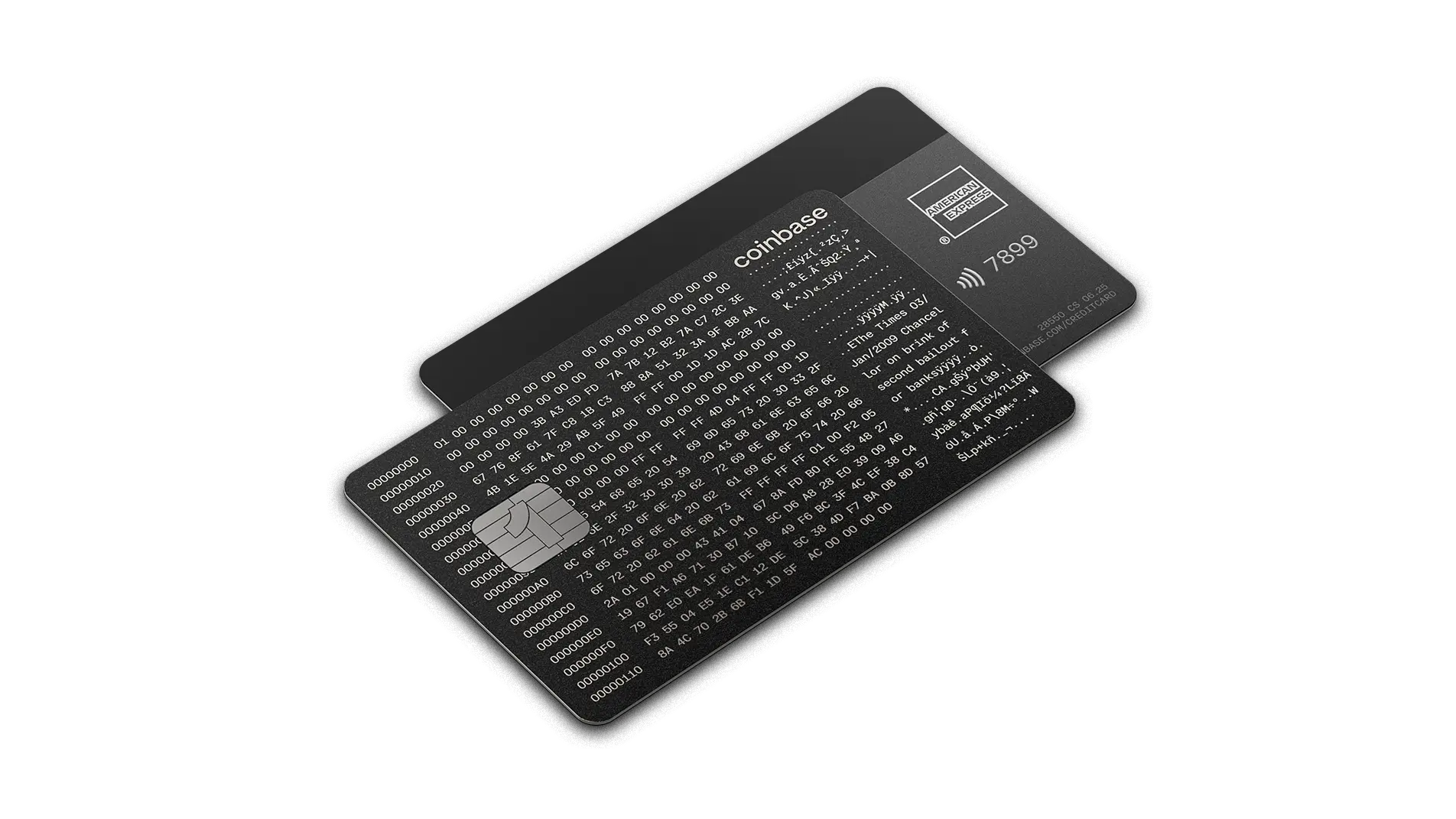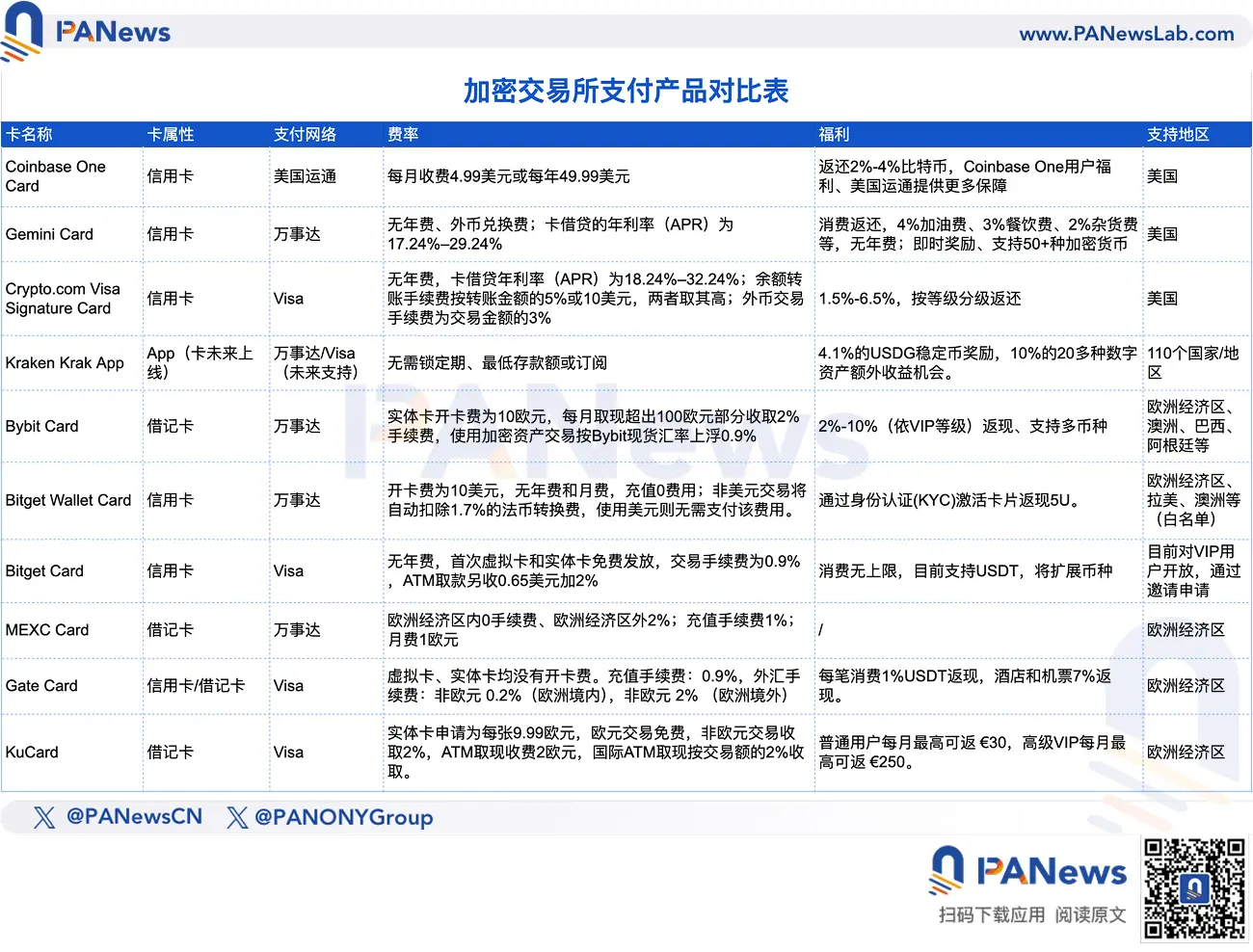Author: Weilin, PANews
As stablecoins and payments gradually become the hot narrative in this round of cryptocurrency, leading centralized exchanges (CEX) are actively laying out their strategies for user daily consumption payments, with an increasingly fierce ecosystem layout around crypto credit cards, debit cards, and app payments.
From Coinbase, Gemini, Crypto.com, to Kraken, Bybit, Bitget, Gate, KuCoin, various trading platforms are launching or upgrading payment products to compete for the connection channels between crypto assets and the real world. Most crypto payment cards support major markets such as the European Economic Area and the United States, with several platforms offering 2%-10% crypto cashback benefits.
In this article, PANews will introduce the latest crypto payment cards or payment apps launched by these exchanges.
Coinbase: Leveraging the American Express Network, Launches Coinbase One Card
On June 13, Coinbase announced the launch of the Coinbase One Card, which will be available exclusively to Coinbase One members in the U.S. Coinbase One is the cryptocurrency platform's monthly subscription product, offering zero trading fees, higher staking rewards, and other benefits. Additionally, Coinbase has launched a lower-priced "Basic" subscription plan supported by the American Express network, with the Coinbase One Card expected to be available in the fall of 2025.

Cardholders will be able to earn 2% to 4% Bitcoin cashback, enjoying experiences, protections, and other benefits provided in partnership with the American Express network. Coinbase One charges a monthly fee of $29.99, while the basic level with lower Bitcoin cashback costs $4.99 per month or $49.99 per year.
This is Coinbase's first crypto credit card; it previously launched a crypto prepaid debit card in partnership with Visa in 2020.

Gemini: Cashback Based on Spending Categories, Emphasizing Instant Rewards Mechanism
Gemini attracts users with a more flexible cashback structure, launching a no-annual-fee credit card that supports over 50 cryptocurrencies as cashback options. If users get approved for the credit card before June 30, 2025, and spend $3,000 within the first 90 days of account opening, they will receive a $200 cryptocurrency reward.
This is a Mastercard that offers various benefits through its network, including points for Instacart and Peacock Premium, with Gemini credit cardholders receiving rewards in optional cryptocurrencies. Gemini provides rewards for the following types of spending:
- 4% cashback on the first $300 spent on gas and electric vehicle charging each month, 1% on amounts over that; the spending cycle resets on the 1st of each month
- 3% cashback on dining expenses
- 2% cashback on grocery expenses
- 1% cashback on all other eligible spending
Gemini supports over 50 cryptocurrencies, including major coins like Bitcoin and Ethereum. Users can change the type of cryptocurrency earned through spending at any time. To apply for this credit card, a Gemini trading account must be opened.
Unlike many other credit cards, rewards earned on the Gemini card cannot be directly used for repayments. Additionally, the Gemini credit card does not charge an annual fee or foreign transaction fees. However, selling or converting cryptocurrency rewards incurs relevant transaction fees. The card's annual percentage rate (APR) ranges from 17.24% to 29.24%, with late payment fees up to $8 and returned payment fees up to $35.
Crypto.com: Tiered Cashback, Creating a Crypto Credit Card Incentive System
PANews previously introduced Crypto.com's prepaid card in May, which is similar to a debit card requiring preloading. In June, Crypto.com specifically launched the Crypto.com Visa Signature credit card for the U.S. market.
This card has an APR of 18.24% to 32.24%, fluctuating based on the credit status at account opening and the prime rate; balance transfer fees are 5% of the transfer amount or $10, whichever is higher; foreign transaction fees are 3% of the transaction amount, calculated in USD.
Every time the card is used for purchases, users can earn cryptocurrency rewards:
Obsidian: 6.5% cashback in the first year, then 5%
Rose/Icy: 5% cashback in the first year, then 4%
Jade/Indigo: 3.5% cashback in the first year, then 3%
Ruby: 2.5% cashback in the first year, then 2%
Midnight: 1.5% cashback
Note: The first year's reward rates are valid for 12 months from the date of level upgrade or credit card activation.
Kraken: Launches Payment App "Krak," Competing with Venmo and PayPal
The exchange Kraken has entered the payment space with an application. On June 26, Kraken officially released Krak: a next-generation integrated global currency application. Users can seamlessly manage over 300 different fiat and digital assets.
The Krak app will feature the following functionalities:
Peer-to-Peer Payments: Economically send instant remittances to other Krak app users in 110 different countries/regions. Using personalized payment IDs (Kraktags), users can send and request payments seamlessly across over 300 assets (including cryptocurrencies, stablecoins, and fiat currencies, if applicable) without entering bank information or crypto wallet addresses.
Exclusive Spending and Earning Accounts: Seamless payments and rewards without lock-in periods, minimum deposits, or subscriptions.
Eligible users can earn up to 4.1% on USDG stablecoin balances and have additional earning opportunities of up to 10% on over 20 digital assets.
Future Development Plans for Krak: Launch physical and virtual Krak cards, enabling seamless spending with fiat and crypto assets at millions of merchants (online and offline) within the Krak app; a series of prepaid services, including lending, loans, and credit card plans.

Bybit: Focuses on Crypto Debit Card, High-Level Users Enjoy 10% Cashback
The Bybit card is a Mastercard crypto debit card that allows users to quickly and conveniently use cryptocurrency funds for purchases anytime, anywhere. The Bybit card offers both virtual and physical card versions, currently available to users in the European Economic Area (EEA) and Switzerland, AIFC, Australia, Brazil, and Argentina.
The activation fee for the physical card is €10, and users in the Eurozone are charged a 2% fee for cash withdrawals exceeding €100 per month. Using crypto assets for transactions incurs a 0.9% markup based on Bybit's spot exchange rate, while foreign currency exchanges incur an additional 0.5% on top of the Mastercard exchange rate.
When shopping, users can enjoy cashback ranging from 2% to 10%, depending on their Bybit VIP level. During the card's promotional phase, Bybit offered 10% cashback to new Bybit cardholders who registered between January 1, 2025, and March 31, 2025. The card supports USD as fiat currency. Currently supported cryptocurrencies include: BTC, ETH, XRP, TON, USDT, USDC, MNT, and BNB.
Bitget: Dual Card Layout, Wallet Card and Credit Card Each with Focus
The Bitget Wallet Card is a credit card that allows users to conveniently use crypto assets for daily spending. Currently, this card is jointly issued by Bitget Exchange's Bitget Wallet and Immersve, based on the Mastercard network. By activating the card through identity verification (KYC), users can earn a cashback of 5U. When using the card for purchases, non-USD transactions incur a 1.7% fiat conversion fee, automatically deducted during conversion; using USD incurs no fees.
Currently, residents of the following countries or regions are supported: the European Economic Area and the UK, Latin America (Argentina, Chile, Colombia, Ecuador, El Salvador, Guatemala, Mexico, Panama, and Peru), Australia, and New Zealand, with services currently available only to whitelisted users.
The card activation fee is $10, payable upon card activation. The card issued by Immersve has no annual or monthly fees, and there are no fees for reloading. Currently, USDC on the Base network can be reloaded, allowing users to spend directly from the card's assets. The daily spending limit is $5,000, and the annual spending limit is $100,000.
The card supports binding with major third-party payment platforms, including Apple Pay, PayPal, and Google Pay. It can also be used for purchases on numerous overseas e-commerce and service platforms, including but not limited to: Amazon, TikTok, ChatGPT, Grab, etc.
Additionally, Bitget Exchange has launched a crypto credit card based on the Visa network, currently available only to VIP users through invitation applications. There are no annual fees, and the first virtual and physical cards are issued for free, with a transaction fee of 0.9%, and ATM withdrawals incur an additional $0.65 plus 2%. Payments in cryptocurrency are settled in USD, with no limit on Visa card spending. Cardholders must maintain sufficient balances in their Bitget accounts to make successful payments. Users can use the Bitget card anywhere Visa is accepted. Currently, the Bitget card only supports Tether (USDT), but support for BTC, ETH, BGB, USDC, and other currencies is coming soon.
MEXC: European Users Can Apply, Clear Fee Structure
MEXC Mastercard debit card supports applications from users in most countries within the European Economic Area (EEA), with a recharge fee of 1%, a single transaction limit of 3,000 USDT, and a monthly transaction limit of 30,000 USDT; the card capacity is 100,000 USDT.
Transaction fees within the EEA are 0, while transactions outside the EEA incur a fee of 2% (with a minimum of €0.60 per transaction). The monthly fee for this card is €1.
Although the official introduction of the card by MEXC is relatively simple, its stable cost structure and wide applicability may make it a popular choice for many European crypto users in the future.
Gate: Rebates Combined with Platform Benefits, Highlighting Consumption Scenario Advantages
Gate Card is a crypto credit/debit card product launched by the Gate platform, designed to integrate cryptocurrency services into daily life. Users can transact by recharging with cryptocurrency or directly consuming crypto assets from their trading accounts while enjoying various benefits both on and off the platform.
The card supports Visa-EUR, and there are no activation fees for either virtual or physical cards. The payment types include recharge consumption, with a recharge fee of 0.9%, and foreign exchange fees of 0.2% for non-euro transactions within Europe and 2% for transactions outside Europe. The consumption limit per day is 25,000 EUR, and Gate Card supports Google Pay/ATM.
In terms of consumption scenarios, users enjoy 1% USDT cashback on each purchase, 7% cashback on hotels and flights, exclusive offers from Gate Travel, and new users receive 2% cashback on spending. Four cryptocurrencies can be chosen for cashback: USDT, BTC, ETH, and GT.
KuCoin: Exclusive for EEA Users, Supports Real-Time Crypto Conversion
KuCard currently supports VISA and is only available to citizens and residents of the European Economic Area (EEA). It supports 54 different cryptocurrencies (including KCS, USDT, USDC, BTC, ETH, XRP, etc.) and one fiat currency (EUR). The application fee for the physical card is €9.99, with free transactions in euros, a 2% fee for non-euro transactions, and a €2 fee for ATM withdrawals, while international ATM withdrawals incur a fee of 2% of the transaction amount.
KuCard supports instant conversion from cryptocurrency to fiat currency, providing cardholders with exclusive rewards and benefits, such as shopping cashback and discounts at partner merchants. KuCard sets a monthly cashback limit based on the user's account assets and VIP level, with regular users eligible for up to €30 cashback, while higher-level VIPs can receive up to €250 per month.
The debit card supports multiple cryptocurrencies, ensuring users can use their preferred digital assets in daily transactions. KuCard supports Apple Pay and Google Pay.
Conclusion:
Overall, for most of the past time, the battleground for crypto exchanges has primarily focused on spot trading, derivatives, and staking. Now, the payment sector has become a new hotspot. From credit cards and debit cards to integrated payment applications and DeFi services, mainstream exchanges are attempting to create a consumption loop of "transaction as life."
Collaboration with traditional financial institutions (such as Visa, Mastercard, and American Express) remains a viable path, but exchanges are also exploring building independent wallets and stablecoin ecosystems, as seen with Krak and Bitget Wallet. In the second half of 2025, as more exchange cards are officially rolled out, the global competition for crypto payments will enter an accelerated phase. Which platform will stand out in the end? Let’s wait and see.
免责声明:本文章仅代表作者个人观点,不代表本平台的立场和观点。本文章仅供信息分享,不构成对任何人的任何投资建议。用户与作者之间的任何争议,与本平台无关。如网页中刊载的文章或图片涉及侵权,请提供相关的权利证明和身份证明发送邮件到support@aicoin.com,本平台相关工作人员将会进行核查。




